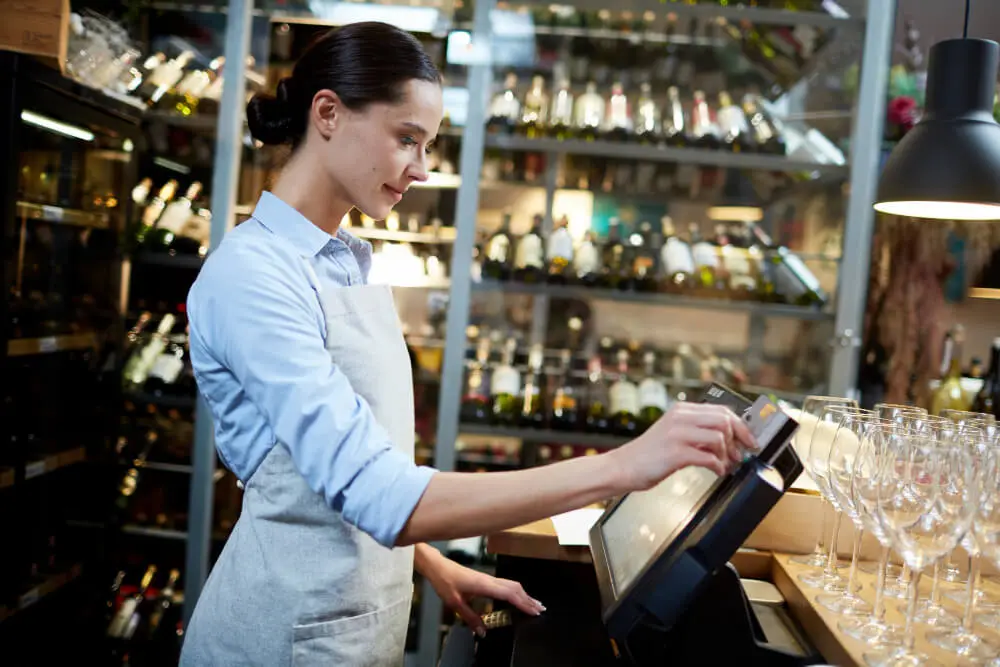Navigating the dynamic landscape of contemporary commerce demands businesses to embrace efficient and organized operations. At the core of this transformation lies the Point of Sale (POS) system, an essential tool for the success of restaurants and businesses alike. Serving as the central system of establishments, POS systems oversee transactions, keep tabs on inventory, and facilitate customer interactions. In this guide, we delve into the diverse POS systems available in 2024, shedding light on their unique benefits. From traditional POS systems offering stability and reliability to tablet and mobile POS systems enhancing flexibility, and cutting-edge cloud POS systems revolutionizing operations – each type plays a vital role in shaping a business’s efficiency and customer satisfaction. Understanding these POS options is pivotal for businesses aiming to stay ahead in a competitive market and provide seamless experiences for their patrons.
What is a Point of Sale System?
A Point of Sale (POS) system is a sophisticated combination of hardware and software designed to simplify and enhance the transaction process. It goes beyond the traditional cash register by integrating inventory management, sales analytics, and customer relationship management. The primary aim is to provide businesses with a comprehensive tool to facilitate smooth transactions while optimizing overall operational efficiency.
Types of POS Systems:
Traditional POS System
The traditional POS system has been a cornerstone in the retail and hospitality industry for decades. It typically consists of a dedicated terminal with specialized hardware such as cash drawers, receipt printers, and barcode scanners. This type of POS system is ideal for businesses with high transaction volumes, as it offers robust features for inventory management and reporting. While reliable, traditional POS systems may require a significant upfront investment and are less flexible compared to newer alternatives.
Tablet POS System
Tablet POS systems have gained popularity due to their flexibility and user-friendly interfaces. Utilizing tablets or iPads as the main terminal, these systems are perfect for businesses with limited counter space. Tablet POS systems offer mobility, enabling staff to take orders, process payments, and manage tables from anywhere in the establishment. Additionally, they often come with customizable features, making them suitable for a variety of industries, from restaurants to small retail shops.
Mobile POS System
Mobile POS systems take flexibility to the next level by allowing businesses to conduct transactions on smartphones or other handheld devices. Ideal for businesses on the move, such as food trucks or pop-up shops, mobile POS systems provide a lightweight and portable solution. Beyond transaction processing, they often offer features like inventory tracking and customer engagement. The adaptability of mobile POS systems makes them a valuable asset for businesses looking to stay nimble in a dynamic market.
Cloud POS System
Cloud POS systems represent the cutting edge of POS technology. By leveraging the power of cloud computing, these systems provide businesses with real-time access to data from anywhere with an internet connection. Cloud POS eliminates the need for on-site servers, reducing maintenance costs and allowing for seamless updates. With the ability to centralize data across multiple locations, cloud POS systems are particularly beneficial for businesses with multiple branches, enabling centralized management and improved scalability.
Benefits of Different Types of POS Systems
Traditional POS System
Traditional POS systems offer a stable and reliable foundation for businesses with consistent transaction volumes. They excel in inventory management, providing detailed tracking of stock levels and aiding in order replenishment. While the upfront costs may be higher, the long-term benefits of a robust and durable system make traditional POS a solid investment for established businesses.
Stability and Reliability: Traditional POS systems provide a stable and reliable foundation, ensuring consistent performance even during high transaction volumes. This stability is essential for businesses with a steady flow of customers.
Inventory Management Excellence: Excel in comprehensive inventory management, offering detailed tracking of stock levels. This feature aids businesses in optimizing stock levels, preventing shortages, and facilitating efficient order replenishment.
Long-term Durability: Despite higher upfront costs, traditional POS systems offer a long-term investment with robust and durable hardware. This durability ensures that businesses can rely on their POS system for years, minimizing the need for frequent replacements.
Integrated Financial Tracking: Traditional POS systems often come with integrated financial tracking features, making it easier for businesses to monitor sales, expenses, and profits in a consolidated manner. This streamlines financial reporting and analysis.
Customization Options: Many traditional POS systems allow for customization based on specific business needs. This adaptability ensures that businesses can tailor the system to suit their unique requirements, from menu configurations to reporting preferences.
Tablet POS System
Tablet POS systems provide businesses with increased flexibility and mobility. Staff can take orders directly at the table, enhancing the overall dining experience. The intuitive interfaces make training new employees a breeze, and the compact nature of the system saves valuable counter space. Tablet POS is an excellent choice for businesses seeking a modern, adaptable solution without sacrificing functionality.
Enhanced Flexibility and Mobility: Tablet POS systems provide businesses with increased flexibility as staff can take orders directly at the table. This mobility enhances the overall dining experience, allowing for more efficient and personalized service.
Intuitive Interfaces: The intuitive interfaces of tablet POS systems make them user-friendly and easy to learn. This feature is particularly beneficial for businesses with high employee turnover, as new staff can quickly become proficient in using the system.
Space-saving Compact Design: The compact nature of tablet POS systems saves valuable counter space, making them suitable for businesses with limited space. This design also adds a modern and unobtrusive aesthetic to the establishment.
Order Accuracy Improvement: By taking orders directly at the table, tablet POS systems reduce the chances of errors that may occur during order relay. This leads to improved order accuracy, enhancing customer satisfaction.
Adaptable for Various Industries: Tablet POS systems are adaptable for use in various industries beyond restaurants, such as retail and hospitality, making them a versatile solution for businesses with diverse needs.
Mobile POS System
Mobile POS systems cater to businesses on the move, breaking free from the confines of a traditional brick-and-mortar setting. The ability to accept payments anytime, anywhere, provides a significant advantage for businesses participating in events, markets, or offering delivery services. Mobile POS systems are a testament to the evolving landscape of commerce, providing a convenient and efficient solution for modern businesses.
On-the-Go Payment Acceptance: Mobile POS systems cater to businesses on the move, allowing them to accept payments anytime and anywhere. This feature is particularly advantageous for businesses participating in events, markets, or offering delivery services.
Increased Customer Engagement: The mobility of mobile POS systems enables staff to engage with customers directly on the sales floor. This interaction can lead to upselling opportunities and the ability to provide a more personalized shopping experience.
Convenient Transaction Processing: Offering a convenient and efficient solution, mobile POS systems expedite transaction processing. This is especially valuable during peak hours or in environments where traditional checkout counters may be impractical.
Real-time Inventory Updates: Many mobile POS systems come equipped with real-time inventory tracking, providing businesses with instant updates on stock levels. This feature aids in inventory management and helps prevent stockouts or overstock situations.
Adaptability to Diverse Business Models: Mobile POS systems are adaptable to various business models, making them suitable for not only retail and hospitality but also service-oriented businesses. Their flexibility accommodates a wide range of industries.
Cloud POS System
Cloud POS systems revolutionize the way businesses manage their operations. With real-time data access, businesses can make informed decisions on-the-fly. The scalability of cloud POS allows for easy expansion, making it an ideal choice for growing enterprises. The elimination of on-site servers reduces the risk of data loss and simplifies maintenance, offering businesses a reliable and future-proof solution.
Real-time Data Access: Cloud POS systems revolutionize operations by providing real-time data access from anywhere with an internet connection. This feature allows businesses to make informed decisions on-the-fly, enhancing overall agility.
Scalability for Growth: The scalability of cloud POS allows for easy expansion, making it an ideal choice for growing enterprises. Businesses can effortlessly add new locations or increase the number of terminals without the need for extensive hardware investments.
Cost-effective Maintenance: The elimination of on-site servers reduces the risk of data loss and simplifies maintenance. Cloud POS systems typically require less in-house IT support, making them a cost-effective solution for businesses looking to minimize ongoing expenses.
Centralized Management: With the ability to centralize data across multiple locations, cloud POS systems facilitate centralized management. This feature is invaluable for businesses with multiple branches, providing a cohesive view of operations.
Future-proof Technology: Cloud POS represents a future-proof solution as updates and improvements can be seamlessly implemented without disruptions. Businesses can stay at the forefront of technology without the need for frequent system overhauls.
Conclusion:
In the constantly evolving landscape of business and technology, choosing the right POS system is crucial for success. Each type of POS system comes with its unique benefits, catering to different business models and industries. Whether opting for the reliability of a traditional system, the flexibility of a tablet or mobile solution, or the cutting-edge capabilities of a cloud-based system, businesses can enhance their operations and provide superior customer experiences in 2024 and beyond.







